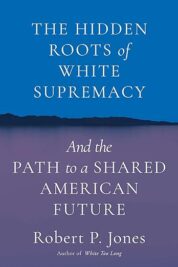
By Robert P. Jones. Shows how the enslavement of Africans was not America’s original sin but, rather, the continuation of acts of genocide and dispossession flowing from the first European contact with Native Americans. It started with the Doctrine of Discovery: the belief that God had designated all territory not inhabited or controlled by Christians as their new promised land — which would shape the way five centuries of European Christians would understand the “discovered” world and the people who populated it.
Shows the connections between Emmett Till and the Spanish conquistador Hernando De Soto in the Mississippi Delta, between the lynching of three Black circus workers in Duluth and the mass execution of thirty-eight Dakota men in Mankato, and between the murder of 300 African Americans during the burning of Black Wall Street in Tulsa and the Trail of Tears.
This reframing of American origins explains how the founders of the United States could build the philosophical framework for a democratic society on a foundation of mass racial violence—and why this paradox survives today in the form of white Christian nationalism. Through stories of people navigating these contradictions in three communities, illuminates the possibility of a new American future which may finally fulfill the promise of a pluralistic democracy. Read more.
